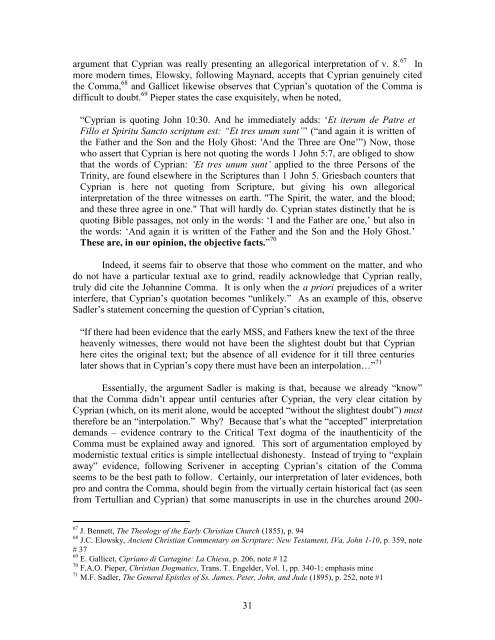A Defense of the Johannine Comma - Study to Answer.Net
A Defense of the Johannine Comma - Study to Answer.Net
A Defense of the Johannine Comma - Study to Answer.Net
Create successful ePaper yourself
Turn your PDF publications into a flip-book with our unique Google optimized e-Paper software.
argument that Cyprian was really presenting an allegorical interpretation <strong>of</strong> v. 8. 67 In<br />
more modern times, Elowsky, following Maynard, accepts that Cyprian genuinely cited<br />
<strong>the</strong> <strong>Comma</strong>, 68 and Gallicet likewise observes that Cyprian’s quotation <strong>of</strong> <strong>the</strong> <strong>Comma</strong> is<br />
difficult <strong>to</strong> doubt. 69 Pieper states <strong>the</strong> case exquisitely, when he noted,<br />
“Cyprian is quoting John 10:30. And he immediately adds: ‘Et iterum de Patre et<br />
Fillo et Spiritu Sanc<strong>to</strong> scriptum est: “Et tres unum sunt”’ (“and again it is written <strong>of</strong><br />
<strong>the</strong> Fa<strong>the</strong>r and <strong>the</strong> Son and <strong>the</strong> Holy Ghost: 'And <strong>the</strong> Three are One’”) Now, those<br />
who assert that Cyprian is here not quoting <strong>the</strong> words 1 John 5:7, are obliged <strong>to</strong> show<br />
that <strong>the</strong> words <strong>of</strong> Cyprian: ‘Et tres unum sunt’ applied <strong>to</strong> <strong>the</strong> three Persons <strong>of</strong> <strong>the</strong><br />
Trinity, are found elsewhere in <strong>the</strong> Scriptures than 1 John 5. Griesbach counters that<br />
Cyprian is here not quoting from Scripture, but giving his own allegorical<br />
interpretation <strong>of</strong> <strong>the</strong> three witnesses on earth. "The Spirit, <strong>the</strong> water, and <strong>the</strong> blood;<br />
and <strong>the</strong>se three agree in one." That will hardly do. Cyprian states distinctly that he is<br />
quoting Bible passages, not only in <strong>the</strong> words: ‘I and <strong>the</strong> Fa<strong>the</strong>r are one,’ but also in<br />
<strong>the</strong> words: ‘And again it is written <strong>of</strong> <strong>the</strong> Fa<strong>the</strong>r and <strong>the</strong> Son and <strong>the</strong> Holy Ghost.’<br />
These are, in our opinion, <strong>the</strong> objective facts.” 70<br />
Indeed, it seems fair <strong>to</strong> observe that those who comment on <strong>the</strong> matter, and who<br />
do not have a particular textual axe <strong>to</strong> grind, readily acknowledge that Cyprian really,<br />
truly did cite <strong>the</strong> <strong>Johannine</strong> <strong>Comma</strong>. It is only when <strong>the</strong> a priori prejudices <strong>of</strong> a writer<br />
interfere, that Cyprian’s quotation becomes “unlikely.” As an example <strong>of</strong> this, observe<br />
Sadler’s statement concerning <strong>the</strong> question <strong>of</strong> Cyprian’s citation,<br />
“If <strong>the</strong>re had been evidence that <strong>the</strong> early MSS, and Fa<strong>the</strong>rs knew <strong>the</strong> text <strong>of</strong> <strong>the</strong> three<br />
heavenly witnesses, <strong>the</strong>re would not have been <strong>the</strong> slightest doubt but that Cyprian<br />
here cites <strong>the</strong> original text; but <strong>the</strong> absence <strong>of</strong> all evidence for it till three centuries<br />
later shows that in Cyprian’s copy <strong>the</strong>re must have been an interpolation…” 71<br />
Essentially, <strong>the</strong> argument Sadler is making is that, because we already “know”<br />
that <strong>the</strong> <strong>Comma</strong> didn’t appear until centuries after Cyprian, <strong>the</strong> very clear citation by<br />
Cyprian (which, on its merit alone, would be accepted “without <strong>the</strong> slightest doubt”) must<br />
<strong>the</strong>refore be an “interpolation.” Why? Because that’s what <strong>the</strong> “accepted” interpretation<br />
demands – evidence contrary <strong>to</strong> <strong>the</strong> Critical Text dogma <strong>of</strong> <strong>the</strong> inau<strong>the</strong>nticity <strong>of</strong> <strong>the</strong><br />
<strong>Comma</strong> must be explained away and ignored. This sort <strong>of</strong> argumentation employed by<br />
modernistic textual critics is simple intellectual dishonesty. Instead <strong>of</strong> trying <strong>to</strong> “explain<br />
away” evidence, following Scrivener in accepting Cyprian’s citation <strong>of</strong> <strong>the</strong> <strong>Comma</strong><br />
seems <strong>to</strong> be <strong>the</strong> best path <strong>to</strong> follow. Certainly, our interpretation <strong>of</strong> later evidences, both<br />
pro and contra <strong>the</strong> <strong>Comma</strong>, should begin from <strong>the</strong> virtually certain his<strong>to</strong>rical fact (as seen<br />
from Tertullian and Cyprian) that some manuscripts in use in <strong>the</strong> churches around 200-<br />
67<br />
J. Bennett, The Theology <strong>of</strong> <strong>the</strong> Early Christian Church (1855), p. 94<br />
68<br />
J.C. Elowsky, Ancient Christian Commentary on Scripture: New Testament, IVa, John 1-10, p. 359, note<br />
# 37<br />
69<br />
E. Gallicet, Cipriano di Cartagine: La Chiesa, p. 206, note # 12<br />
70<br />
F.A.O. Pieper, Christian Dogmatics, Trans. T. Engelder, Vol. 1, pp. 340-1; emphasis mine<br />
71<br />
M.F. Sadler, The General Epistles <strong>of</strong> Ss. James, Peter, John, and Jude (1895), p. 252, note #1<br />
31


